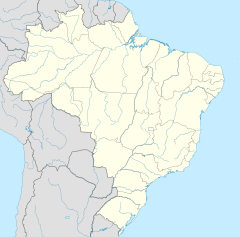Ilê Axé Opô Afonjá
| Ilê Axé Opó Afonjá | |
|---|---|

Ilê Axé Opó Afonjá, the Casa de Xangô, Salvador, Bahia, Brazil
|
|
| Basic information | |
| Geographic coordinates | 12°59′49″S 38°29′42″W / 12.997081°S 38.494881°W |
| Affiliation | Candomblé |
| Sect | Ketu |
| Municipality | Salvador |
| State | Bahia |
| Country | Brazil |
| Year consecrated | 1910 |
| Founder | Eugênia Ana dos Santos |
| Designated | 1998 |
| Reference no. | 1432 |
Ilê Axé Opó Afonjá, also known as Centro Santa Cruz Axé of Opó Afonjá or Casa de Xangô, is a Candomblé terreiro in Salvador, Bahia, Brazil. It was founded by Eugênia Ana dos Santos (1869-1938), better known as Mãe Aninha, in 1910. The terreiro is located in the Cabula neighborhood on Rua de São Gonçalo do Retiro. Ilê Axé Opó Afonjá was the second Afro-Brazilian religious place of worship to receive heritage status from the Brazilian National Historic and Artistic Heritage Institute (IPHAN).
Ilê Axé Opó Afonjá was formed in 1910 by a group that separated from Ilê Axé Iyá Nassô Oká, or the Casa Branca do Engenho Velho. It is one of the primary temples of the Ketu sect of Candomblé. A terreiro of the same name was founded by Mãe Aninha in Rio de Janeiro.
Ilê Axé Opó Afonjá covers 3.9 square kilometres (1.5 sq mi). Two-thirds of the land is covered in dense vegetation. The remainder includes religious structures, sacred plants, and a fountain dedicated to Oxum. Terreiro structures include a central temple, the Casa de Xangô, and sanctuaries dedicated to Oxalá (Obatala) and Iemanjá.
The terreiro has a public school, the Escola Eugênia Anna dos Santos, founded in 1976. The Ilê Ohum Lailai, also known as the Museu do Axé Opô Afonjá, is a museum founded to house physical objects related to the terreiro, including ceremonial objects, clothing, and cooking implements. It was founded in 1981. The Ikojopo Ilê Iwe Axé Opô Afonjá, also known as the Biblioteca do Axé, is a library opened by the terriro in 1996. Its collection consists of books related to African and Afro-Brazilian culture.
Ilê Axé Opó Afonjá has had five sacerdotisas, or religious leaders since 1910:
Ilê Axé Opó Afonjá holds public festivals including one dedicated to Oxóssi, held on the same day as Feast of Corpus Christi. Another is dedicated to Xangô, which begins on the evening of June 28th and June 29th. Festivals dedicated to other orixás are held on separate cycles.
...
Wikipedia

